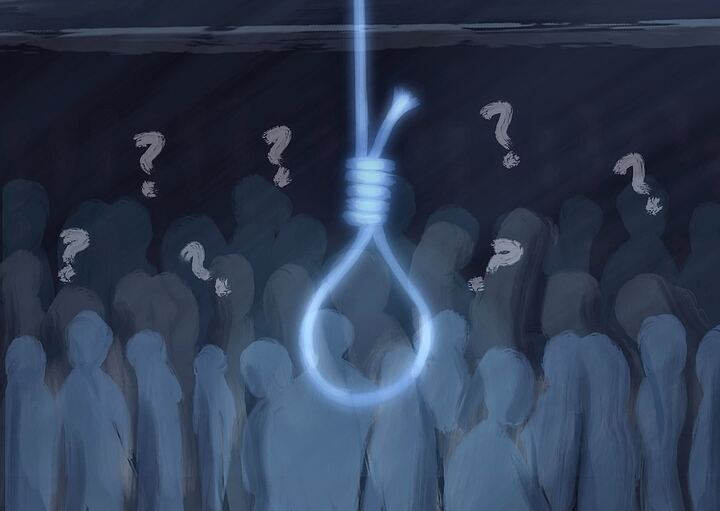In three days, America will execute an innocent man. Despite the many fundamental flaws in the evidence used to convict him, Texan Robert Roberson is currently on death row after being convicted of killing his two-year-old daughter Nikki.
Roberson’s execution is scheduled for Oct. 17, and his legal team has maintained that he is innocent since his initial sentencing in 2002. The state’s case hinges on “shaken baby syndrome,” an outdated and incorrect medical theory, while ignoring Nikki’s actual medical record. It singled out Roberson as a murderer despite investigators identifying over 80 other non-violent potential causes of death.
Sadly, Roberson is hardly alone in being unjustly sentenced to death. Although steps have been taken to make America’s criminal justice system more equitable, it is still riddled with major issues that are only exacerbated by the death penalty.
The death penalty is built upon the premise that those convicted of heinous crimes have been proven guilty “beyond a reasonable doubt” and are therefore deserving of the ultimate punishment. However, over 4% of those on death row are likely innocent while actual murderers escape punishment, highlighting the dangerous hypocrisy of America’s justice system.
Eliminating the death penalty means that America’s judiciary would never kill an innocent person again — not that criminals would walk free. While wrongful prison sentences are tragic, they can be revisited and resolved unlike capital punishment.
Additionally, the death penalty is ineffective at deterring crime, so it does not serve to prevent loss of life resulting from future homicides. Those who engage in criminal activities rarely believe that they will face punishment, so the looming threat of execution fails to disincentivize violent crimes.
In fact, jurisdictions that have not yet abolished the death penalty report murder rates that are nearly 2% higher on average than those that have, suggesting that state-sanctioned killing actually correlates with increased levels of violence.
Furthermore, the death penalty costs states more money than sentencing convicts to life in prison, which consequently diverts more resources from addressing the root causes of violent crime. States that continue to execute convicts simply waste money for no societal benefit.
Even when it comes to executing those who are guilty of heinous crimes like murder, the justice system fails to do so in a humane manner. Since 2000, prisons in America have used lethal injection for 97% of executions as it is seen as less barbaric than electrocution, gas inhalation or other methods.
However, research into autopsy reports in 2020 revealed that lethal injection can induce a sensation similar to suffocation. While it is often presented as a sterile and medical procedure, many lawyers argue that lethal injections “constitute cruel and unusual punishment under the Eighth Amendment.”
While a 2023 Gallup poll found that 55% of Americans favor the death penalty, the moral justification of protecting a society’s citizens from dangerous criminals falls flat due to all of the aforementioned issues. “An eye for an eye” policies do nothing to help those trying to recover from traumatic crimes, and making the whole world go blind in pursuit of misguided vengeance reeks of injustice.
As a society, we have the opportunity to entirely preclude the possibility of wrongfully killing someone just to satisfy those with the most extreme and radical notions of justice. Life imprisonment is a far more sensible alternative when it comes to justice, effectiveness, and practicality — and only a few states still cling on to this unethical relic of the past.
Apart from the philosophical argument that the state should not have the power to take a life for revenge, capital punishment does not meaningfully address any of the problems it is meant to solve and is beset by a multitude of other ethical quandaries. From executing those not conclusively guilty of crimes to not deterring future criminals, the death penalty fails across the board.
America should take the next step to eliminate the death penalty for good and close a dark chapter in its history. The thirst for revenge cannot be the basis for any sort of legal system.


















![“[Building nerf blasters] became this outlet of creativity for me that hasn't been matched by anything else. The process [of] making a build complete to your desire is such a painstakingly difficult process, but I've had to learn from [the skills needed from] soldering to proper painting. There's so many different options for everything, if you think about it, it exists. The best part is [that] if it doesn't exist, you can build it yourself," Ishaan Parate said.](https://harkeraquila.com/wp-content/uploads/2022/08/DSC_8149-900x604.jpg)




![“When I came into high school, I was ready to be a follower. But DECA was a game changer for me. It helped me overcome my fear of public speaking, and it's played such a major role in who I've become today. To be able to successfully lead a chapter of 150 students, an officer team and be one of the upperclassmen I once really admired is something I'm [really] proud of,” Anvitha Tummala ('21) said.](https://harkeraquila.com/wp-content/uploads/2021/07/Screen-Shot-2021-07-25-at-9.50.05-AM-900x594.png)







![“I think getting up in the morning and having a sense of purpose [is exciting]. I think without a certain amount of drive, life is kind of obsolete and mundane, and I think having that every single day is what makes each day unique and kind of makes life exciting,” Neymika Jain (12) said.](https://harkeraquila.com/wp-content/uploads/2017/06/Screen-Shot-2017-06-03-at-4.54.16-PM.png)








![“My slogan is ‘slow feet, don’t eat, and I’m hungry.’ You need to run fast to get where you are–you aren't going to get those championships if you aren't fast,” Angel Cervantes (12) said. “I want to do well in school on my tests and in track and win championships for my team. I live by that, [and] I can do that anywhere: in the classroom or on the field.”](https://harkeraquila.com/wp-content/uploads/2018/06/DSC5146-900x601.jpg)
![“[Volleyball has] taught me how to fall correctly, and another thing it taught is that you don’t have to be the best at something to be good at it. If you just hit the ball in a smart way, then it still scores points and you’re good at it. You could be a background player and still make a much bigger impact on the team than you would think,” Anya Gert (’20) said.](https://harkeraquila.com/wp-content/uploads/2020/06/AnnaGert_JinTuan_HoHPhotoEdited-600x900.jpeg)

![“I'm not nearly there yet, but [my confidence has] definitely been getting better since I was pretty shy and timid coming into Harker my freshman year. I know that there's a lot of people that are really confident in what they do, and I really admire them. Everyone's so driven and that has really pushed me to kind of try to find my own place in high school and be more confident,” Alyssa Huang (’20) said.](https://harkeraquila.com/wp-content/uploads/2020/06/AlyssaHuang_EmilyChen_HoHPhoto-900x749.jpeg)

















